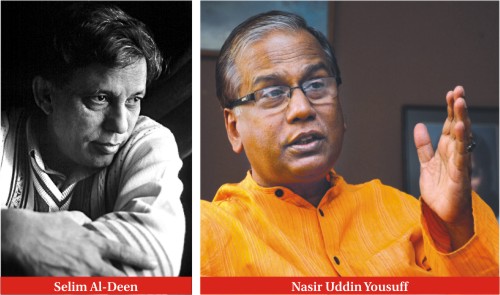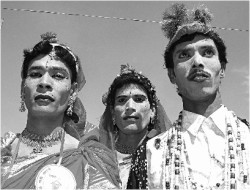| Cover Story
From Insight Desk
Gram Theatre: Finding Our Roots
Rafi Hossain & Saba El Kabir
Nasir Uddin Yousuff. Born on 15 April, 1950, in Dhaka, to Late Abul Fayez Mohammed Yousuff and Begum Shamsun Nahar. Founder President of Bangladesh Gram Theatre. Founder and Artistic Director of Dhaka Theatre. Examiner at Dhaka University and Jahangirnagar University. Secretary General of UNESCO International Theatre Institute (ITI), Bangladesh center. Veteran producer for Bangladesh Television. Director of the critically acclaimed “Ekattorer Jeeshu” (Jesus '71). Celebrated director of over 20 theatre productions. Winner of the Ekushey Padak, 2010. A freedom fighter.

IN this brave, new global age, you are walking down the streets of one of a 21st century megapolis, when suddenly your attention is arrested by an earthen bird-figure being hawked at one of the street-side stalls. You have seen that form before, at a fair of folk-craft in a land that lies about 8000 miles away, and you wonder if that land could be its port of origin. Upon closer inspection, you realize that it is not where it is form; but still, the resemblances are striking.
Similarities in the motifs of different folk traditions, be it in themes of their stories, the melodies of their tunes, the lines of their art, is a well-document phenomenon. Perhaps you are taking in the opera at a theatre in Rome, when suddenly a tiny melodic phrase reminds you of a performance of Shohrab Rushtam or Dewana Madina. But in a world where the cultural-sphere is dominated by mass-produced entertainment, we are increasingly running the risk of these folk traditions, found in every corner of the globe, becoming exhibits at museums, or pages in the archives of libraries - extinct, and barely remembered.
Not a few scholars have pointed at Horasim Lebedev, and his adaptation of English drama into Bangla as the origin of Bangla theatre. But however one was to look at it, this claim cannot be farther from truth. While it is true Lebedev was the first to present his Bangla plays at the Proscenium Theatre in 1795, to say that this was the origin of Bangla theatre would be to completely ignore the rich theatrical heritage of our folk traditions, which would predate Lebedev by at least a thousand years.
After the war of '71, a group of young men and women came together to form a theatre-group, based around Dhaka University, inspired by the philosophies of Absurd theatre. This was the birth of Dhaka Theatre, under the leadership of Nasiruddin Yusuff, and with Dr. Selim Al Deen, Raisul Islam Asad, Pijush Bandapadhay as the founding members. The group was later joined by Shimul Yousuff. At that point, theatre, as they knew it, was completely dominated by the ideas and forms of the West. Predictably, in a newly independent nation grappling for its identity, this soon led to a sense of disquiet among the group. Why should Bangla theatre be completely dependent on foreign concepts; why should its cultural roots and heritage be ignored? Bangladesh's deeply rooted folk tradition boasts of a wide variety of performing arts, with its own unique forms, motifs, and aesthetic sensibilities. This realization led a complete paradigm shift for Dhaka theatre.
More and more, Dhaka Theatre tried to embrace the indigenous art forms of the land. But there were hurdles to be overcome. Dhaka Theatre was formed by a group of urbanites, with very little exposure to the indigenous cultures of the land. They soon realized that before they could fully embrace the folk cultures, they would first have to find out about them. Work began on creating a network of theatre groups, a nationwide forum, through which information and knowledge of the indigenous cultures of a region can be shared with all. This was the birth of Gram Theatre.
Gram Theatre was formed in 1981. Today, it is a network 262 theatres around Bangladesh. Taluknagar Theatre, of Taluknagar, Manikganj, was the first Gram Theatre unit to be established. It was inaugurated through Azharuddin Boyati's Mela (Azharuddin Boyati's Fair), and it presented Seleem Al-Deen's “Saiful Muluk Bodiuzzaman”. As is the norm, the play went on through the night. Just at the point of dawn, there was particular scene where a character had taken of a long scarf and held it as it fluttered in the air, against a backdrop of the rising sun. The scene was of such strength that Nasir Uddin Yousuff commented that althought Dhaka theatre had also staged the play recently, the Taluknagar production was way ahead of it.

Gram Theatre has been operating for 29 years, and have made a place for itself in virtually every corner of the nation. We asked Nasir Uddin Yousuff, or Bachchu Bhai, as he is known by everybody around him, how successful he thought Gram theatre was.
Nasir Uddin Yousuff: We are successful in the sense that Gram theatre has helped many become more acutely aware of our cultural roots and traditions. Today, the major theatre groups are working much more closely with artistic traditions and sensibilities of the land, which was not the case before Gram Theatre started. Gram Theatre has also played a major role in popularizing Selim Al-Deen's narrative style of writing, which is more in touch with our cultural roots.
However, if we are to look at it from an institutional, organizational perspective, it is fair to say that our successes have been somewhat limited.
 Star Insight: Why do you think Gram Theatre have not been able to take on a more institutional form? Star Insight: Why do you think Gram Theatre have not been able to take on a more institutional form?
NY: Firstly, when Gram Theatre was formed, it was never actively assisted by the government. And from the start, we were strongly against working with foreign funding. This meant that we had no real sources of funding. We would try and make do with personal donations, Gram Theatre activists would contribute whatever they could, but that could never have been enough. For an institution to form, we need infrastructure and funds; we had neither.
However, today we are feeling very strongly the need to have a more concrete organization, and are working towards that end. The current government have agreed help us in that regard. In cooperation with the government, Gram Theatre is starting up a pilot project we call “Cultural School of Bangldesh”, which shall offer cultural courses in 25 schools around the nation. Once this is successfully completed, the scope of the programme will expand to take on many more schools.
SI: After the death of Selim Al-Deen, Gram theatre must be facing a major challenge in filling the intellectual and creative void left by such a key figure. How is Gram Theatre dealing with this issue?
NY: Replacing Selim like-for-like will of course be impossible. But there are many who are producing quality writings and are contributing actively, such as, Asadullah Farazi, Toufiq Hasan Moyna, Kazi Said Hossain Dulal, Mossadeq Millat, Afasar Ahmed, and many others. If one talks about leadership, it is harder to locate strong organizers from the younger generations, as many are forced to abandon their cultural aspiration in search of a financially viable career, but even then, there are some who are currently being molded into leaders for the future.
Encouragingly, through the series of programmes that was organized to commemorate Selim Al-Deen and his work after his death, we have seen signs of many young members stepping up to take responsibility in organizing these progammes, in taking on leadership roles. We will not be able to replace Selim Al-Deen, but I am confident the younger generation of Gram Theatre is well-equipped to take us forward.
SI: What are Gram Theatre's plans for the future?
NY: Selim Al-Deen had a dream of building a “World Cultural Center”, a place where those interested in exploring the folk cultures of the world can come together and share ideas. The center would include research and archival facilities, and shall conduct programmes to facilitate learning and skills development. Guests would be invited from home and abroad, and we would be a perpetual exposition of the world folk cultures. Although his dream could not be achieved in his lifetime, we have started work to realize this vision. A site has already been identified in Savaar.
Gram Theatre was the first to showcase the folk traditions of Bangladesh to the urban circles. Other organizations have today taken up this challenge as well, which is encouraging. Gram theatre will continue to work closely with the folk arts, and in bridging the gaps between our traditions and our present.
 In an increasingly globalized age, we are running the risk of a mono-cultural world more than ever before. If the indigenous folk art forms are to thrive again, they will need a degree of patronage, to be able to standup to the onslaught of satellite TV and entertainment that offers instant gratification, no strings attached. Institutions such as Gram theatre can provide this very patronage, a means for the folk traditions of a land to return to their place in the hearts of its people. The cultural awareness that it promotes is the key to building a colourful, vibrant, tolerant, and progressive society. Such a society will inevitably be proponents of globalization themselves, but this time around it would be globalization done right. It will not be globalization based on hegemony and domination, but rather, tolerance and unity, a multilateral phenomenon that encourages interactions rather than impositions. In an increasingly globalized age, we are running the risk of a mono-cultural world more than ever before. If the indigenous folk art forms are to thrive again, they will need a degree of patronage, to be able to standup to the onslaught of satellite TV and entertainment that offers instant gratification, no strings attached. Institutions such as Gram theatre can provide this very patronage, a means for the folk traditions of a land to return to their place in the hearts of its people. The cultural awareness that it promotes is the key to building a colourful, vibrant, tolerant, and progressive society. Such a society will inevitably be proponents of globalization themselves, but this time around it would be globalization done right. It will not be globalization based on hegemony and domination, but rather, tolerance and unity, a multilateral phenomenon that encourages interactions rather than impositions.
Copyright
(R) thedailystar.net 2009
|
|
